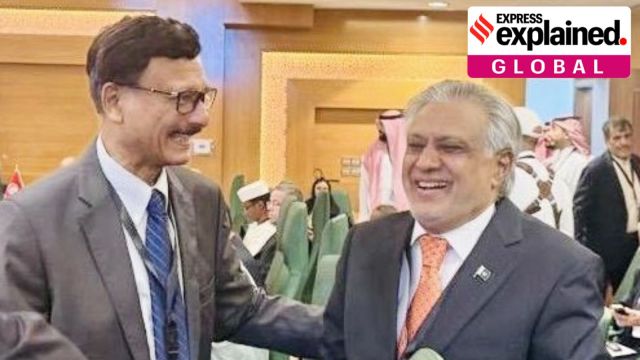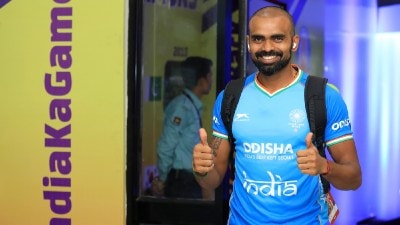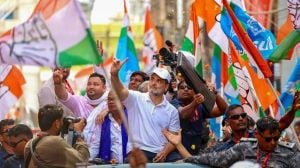Explained: Why 1971 still casts a shadow over Bangladesh-Pakistan ties
During the first bilateral between the countries in 13 years, Pak Foreign Minister Ishaq Dar said that all issues pertaining to 1971 had been settled. Dhaka bluntly rejected the claim
 On Sunday, Bangladesh’s Foreign Adviser Touhid Hossain met Pakistani Foreign Minister Ishaq Dar in Dhaka for the first bilateral meeting between the two countries in 13 years (X/@MIshaqDar50)
On Sunday, Bangladesh’s Foreign Adviser Touhid Hossain met Pakistani Foreign Minister Ishaq Dar in Dhaka for the first bilateral meeting between the two countries in 13 years (X/@MIshaqDar50)The shadow of 1971 continues to linger over Bangladesh-Pakistan ties.
On Sunday, Bangladesh’s Foreign Adviser Touhid Hossain met Pakistani Foreign Minister Ishaq Dar in Dhaka for the first bilateral meeting between the two countries in 13 years. Hossain and Dar expressed optimism for the future of their ties and agreed to boost trade and commerce. But they disagreed about 1971.
Dar claimed that all issues pertaining to 1971 had been “settled”; Hossain disagreed, publicly. “Bangladesh’s position is clear: we want settlement of financial accounts, a formal apology for 1971, and repatriation of stranded Pakistanis. We strongly presented our position. And they also presented theirs,” he said.
Why 1971 matters
The brutality of Pakistani actions in 1971 is deeply ingrained in the national psyche of Bangladesh.
During the nine-month long Mukti Juddho (Liberation War), the Pakistani military and its collaborators — the razakars — committed unspeakable atrocities. Some 3 million people were killed, thousands were tortured and raped, and millions fled their homes.
“While the war culminated in the birth of Bangladesh, it left many wounds festering,” Pakistani historian Anam Zakaria wrote in A People’s History from Bangladesh, Pakistan and India (2019).
This is in part because Pakistan has never apologised for its actions in 1971. Instead, it has gone to great lengths to obliterate the Bangladeshi perspective from its telling of the history of 1971.
In the popular narrative in Pakistan, the Mukti Juddho was actually an Indian conspiracy to break Muhammad Ali Jinnah’s Pakistan project, not a war waged by an oppressed people against their oppressor. While this narrative definitely serves the Pakistani military by allowing to prop the India bogey and amass more power, it has been an impediment in the relationship between Dhaka and Islamabad.
“A better relationship requires Pakistan’s initiative to address the 1971 war, especially the genocide perpetrated by the army… [an] unconditional public apology from Pakistan is long overdue,” Bangladeshi-American political scientist Ali Riaz told The Diplomat in 2021.
“No nation can move forward without confronting its dark past.”
Hasina & Islamabad
Bilateral ties between Dhaka and Islamabad were particularly bad during the reign of Sheikh Hasina in Bangladesh. Hasina, the daughter of Sheikh Mujibur Rahman who is considered to be the ‘Father of Bangladesh’, had made 1971 central to her political agenda.
During her time in office (1996-2001, 2009-2024) she ruthlessly prosecuted razakars for their war crimes, banned the pro-Pakistan Jamaat-e-Islami, and set up the International Crimes Tribunal (ICT) in 2010 to prosecute war criminals. The ICT would go on to send a number of razakars to the gallows — amid opposition from Islamabad.
After the conviction of Jamaat leader Abdul Quader Mollah in 2013, then Pakistan Interior Minister Chaudhry Nisar Ali Khan described Mollah’s execution as “very unfortunate” and said that “there is no doubt that he was hanged because of his loyalty and solidarity with Pakistan in 1971”. Hasina hit back, claiming that “Pakistan still has allies in Bangladesh”.
Her frosty relationship with Islamabad was in contrast to her regard for New Delhi which has historically held a special place in the hearts of many Bangladeshis due to assistance provided in the Mukti Juddho.
During Hasina’s tenure, her clampdown on terrorism and religious extremism was a strategic glue that bound successive Indian governments to her regime, and fostered greater economic and cultural cooperation between India and Bangladesh.
Winds of change?
In August 2024, Hasina was ousted after months of student protests that had gripped the nation. While grievances against her were genuine and popular, the protests were sustained by the efforts of anti-Hasina political interests.
There had always existed a minority in Bangladesh which saw the events of 1971 as a tragedy of the Muslim nation and a betrayal of the founding promise of Partition. The Islamist Jamaat-e-Islami, which opposed the creation of Bangladesh and collaborated with the Pakistan army, has a strong presence in the post-Hasina dispensation in Dhaka.
For the powers that are in Islamabad, a post-Hasina Bangladesh is seen as an opportunity to mend historical differences and foster deep friendship to the detriment of India.
“Clearly, the time has come to extend a hand of friendship towards Bengalis and Bangladesh… The bitter feelings of 1971 should be set aside by both Pakistan and Bangladesh to rebuild their relations,” retired Pakistani diplomat Burhanul Islam wrote in a news portal Paradigm Shift last year.
Dar’s comments on Sunday echoed this sentiment. “Within a family, among brothers, once something is settled, one must purify the heart — even Islam tells us to clean your heart.”
What is notable, however, is Bangladesh’s public rejection of Dar’s claims that all had been settled regarding 1971. While Hossain acknowledged that “the issues of 1971 cannot be solved in a day”, the rejection nonetheless indicates that even under a different dispensation in Dhaka, Pakistan will need to do more to address 1971.
As one opinion article in The Daily Star put it: “One must reconcile with the past for misdeeds and not brush them aside with vague references if only to bring about closure on both sides. There are a number of such examples elsewhere in the world… Japan, in 2016, apologised to South Korea… for its use of Korean “comfort women”… Germany’s Chancellor Willy Brandt fell to his knees at a memorial for Holocaust victims in 1970… if they can do it, why not Pakistan?”


- 01
- 02
- 03
- 04
- 05




































